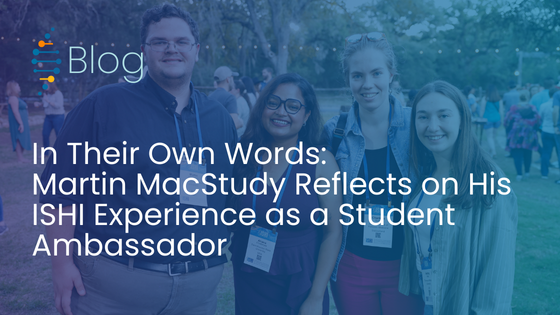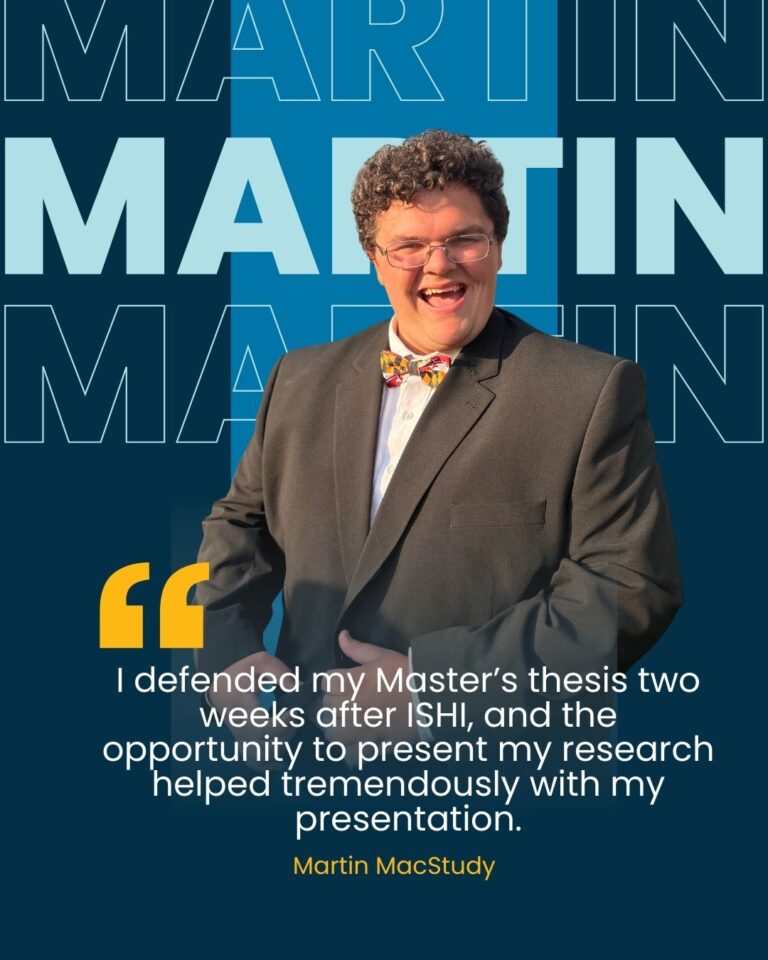Are you a passionate student pursuing a degree in forensic science, eager to dive into the world of cutting-edge research and groundbreaking advancements? Look no further! The ISHI Student Ambassador Program is your exclusive gateway to unparalleled opportunities at the International Symposium on Human Identification (ISHI) conference. The application window opens on February 3, 2025.
Every year, the International Symposium on Human Identification (ISHI) brings together forensic professionals from around the world to share their latest research and connect with peers. But some of the most inspiring moments come from the students—those just starting their journey into the world of forensic science. As part of the ISHI Student Ambassador Program, young scientists are given the opportunity to present their work, engage with leaders in the field, and gain invaluable insights into the profession. In this blog, we sit down with Martin MacStudy, a student at Virginia Commonwealth University and one of this year’s ambassadors to hear about his experiences at ISHI. From connecting with peers to exploring new research methodologies, these reflections offer a unique glimpse into the future of forensic science.

You’ve attended forensic conferences before, but ISHI was your first as a student ambassador. How did the experience of representing fellow students and sharing your research at ISHI differ from your previous conference experiences, and did it meet your expectations in terms of career and personal growth?
As an ISHI student ambassador, I felt like I had a significantly more fulfilling experience than I did at previous conferences I have attended. This is because the student ambassador program allowed me to have hands-on experience during my time at ISHI.
From presenting my research, to being interviewed, to attending workshops, the student ambassador program allowed me to take full advantage of what the conference had to offer. While I feel like each conference I attend aids in my professional development, I have felt more of an observer at previous conferences rather than an active participant.
The student ambassador program exceeded expectations when it came to career and personal growth. For one, it put me in contact with the other student ambassadors, who, like myself, are budding forensic scientists. This program allowed an innate connection to four future forensic scientists. ISHI offered many great opportunities to network, which I was fortunate enough to participate in, and hope will aid in my upcoming job search.
Your current research uses mitochondrial DNA to identify the ancestry of 19th-century juvenile remains, which is both scientifically valuable and deeply meaningful. What was the response to your scientific poster presentation at ISHI, and did any feedback from peers or experts inspire new directions or considerations for your research?
There were a multitude of reactions to my poster presentation. There was shock from learning how the juvenile remains were discovered and how they ended up in the well in the first place. Secondly, there was a lot of encouragement and understanding. One of the greatest limitations of the project was that the samples dated back to the 19th-century; therefore, the DNA obtained was in poor conditions. Many people who stopped by shared their words of encouragement for the project, as well as their own experiences with having to deal with highly degraded samples. While I received a great deal of feedback, there are no new directions the project can proceed in, unfortunately. It was agreed that the testing of the remains would be completed at the end of the summer, so, currently, there are no future projects to be done on these ancestral remains. However, the feedback I obtained offered me insight into other ways I could explain my results.

Networking is a key component of the ISHI experience. How did ISHI help you connect with professionals and peers in the forensic DNA community, and were there any conversations or connections that stood out to you in terms of career opportunities or collaborations?
ISHI greatly aided in creating and building connections with professionals in the forensic DNA community. The breaks with the vendors allowed me to reconnect with individuals who I had spoken to at previous conferences. For example, I had first met Gloria Dimick from Mitotyping Technologies at AAFS, where I had mentioned that I was about to begin a research project utilizing mitochondrial DNA. The breaks with the vendors allowed me a chance to see her again, where I told her I was now wrapping up that same project. ISHI helped facilitate that reconnection. Additionally, at the offsite networking event at Knibbe Ranch, I had the opportunity to talk with some DNA analysts from the North Dakota State Laboratory. When I had asked advice from them, one thing in particular stood out: “Attitude is everything.” This was said in reference to picking where you work, and being open to moving places you may not have previously considered. This especially resonated with me since I am beginning the job hunt. I have spent my whole life living on the East Coast, but my conversation with the North Dakota DNA analysts helped me broaden my horizons.
You mentioned that participating in ISHI would help boost your confidence as you prepare to defend your Master’s thesis later this year. Did your experience at the conference provide you with any new presentation techniques or insights that you plan to apply to your thesis defense or future presentations?
I defended my Master’s thesis two short weeks after the completion of ISHI, and the opportunity to present my research at ISHI helped tremendously with my presentation. It revealed to me which parts were more intuitive, and which aspects I should spend more time explaining. Additionally, I learned that when I get the pre-presentation nerves, I should remember that no one knows what I did better than myself. Knowing that allowed me to remove any anxiety I felt and feel confident in answering whatever questions I may be asked. While I have already defended my thesis, these are lessons I plan on carrying forth to any future presentation I have.
One of your major career goals is to work as a forensic DNA analyst. How did the workshops, presentations, and interactions at ISHI influence your view of the field, and did they provide any clarity or guidance as you approach graduation and search for job opportunities?
The major takeaway I had from my time at ISHI was the reminder of the impact of the work of forensic DNA analysts. I have never attended a conference before where the room felt emotionally charged as a result of the presentations. Yet, that happened on multiple occasions at ISHI. The moments that stick out include the general audience being brought close or fully to tears multiple times during the keynote talks, or the shocked gasp that went across the room when it was revealed that an hour prior, it was decided that charges were being moved to be vacated due to evidence using FIGG. As a student, I’m learning more about the techniques or concepts used by forensic DNA analysts. Therefore, it’s easy to forget the impact of the work I will be doing. This reminder assured me I was in the right field, and it is something that I will carry with me no matter where I end up.

